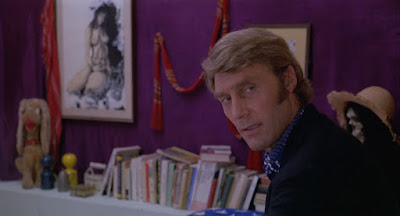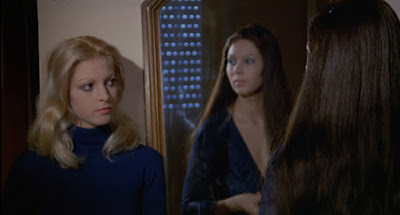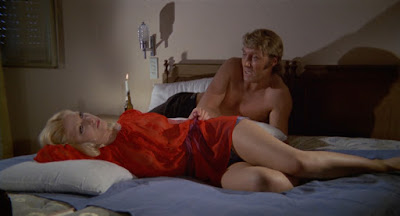“When analyzed with any degree of honesty, jealous behavior appears, in reality, neither as a duty nor a right, but as a shabby dross of our obsession with possessing.” – Emmanuelle Arsan – L’hypothese d’Eros
A weekend getaway at a resort hotel with your significant other is most people’s idea of a relaxing holiday, but having to hide out in a creepy, possibly haunted hotel with your mistress for the weekend, because your wife turned up murdered, sounds like a more interesting time to me.
Death Falls Lightly is one of two thrillers directed and co-written by Leopoldo Savona (the other being Byleth – The Demon of Incest (1972)) that I commend for its unusual and multidirectional approach. You’re not really sure what they’re going for, but you kind of like it anyways. Like Byleth, it’s a little hard to compare to other films of its ilk, since it’s kind of an oddball example. It reaches for different ideas, perhaps one too many, while maintaining that appealing ’70s Euro-genre ascetic, so you’re getting something both different and familiar at the same time. Whether or not it’s actually any good is somewhat difficult to tell by the film’s end.
I personally find this one delightful, as it is a bit of a jack-of-all-trades genre movie that borrows from crime, mystery, giallo, erotic, fantastical, psychological, and occult horror, so it’s like there’s a little bit of something for everyone. It is mostly centered around a claustrophobic and somewhat dark and depressing hotel. Interestingly, this movie predicts The Shining during a few moments, and my mind even thought a little of Silent Hill at times.
A pawn for political corruption, Giorgio (Nude for Satan’s Stelio Candelli), has returned to Rome from his trip to Milan to find his wife murdered at home. Since he was transporting drugs for politicians, he cannot reveal to the authorities that he was in Milan during the time his wife was murdered. He doesn’t seem too sad about his wife but more worried about himself. Knowing he will be considered a suspect by the police, Giorgio barges in on his solicitor, a judge, Magistrate Magrini (Watch Me When I Kill’s Fernando Cerulli), at his home to demand that he finds him an alibi or else they’ll all go down. It’s eventually decided, for the time being, that Giorgio must hide out for the weekend in a grand eighty room, supposedly empty, hotel in the middle of the noisy city. For company and presumably to make sure his sexual needs stay fulfilled, Giorgio also insists that he bring his mistress, the sumptuous Liz (Night of the Damned’s Patrizia Viotti), to hide out with him. (Because that won’t further exasperate the scandal.)
This one takes a number of interesting directions, starting when Giorgio and Liz isolate themselves in the hotel. The stage is initially set for a scandalous love affair that does play out for a while. What was peculiar to me is that Giorgio not only brought his mistress, but he also brought a projector to screen an Italian erotic film. As he puts it to Liz, “Italy produces more than most.” It’s fair to say that pornography was much more of a novelty back in 1972, and the experience does seem to turn them on, as they are eventually driven to make love while the film plays in the background (a clip from Savona’s own Byleth), visually amplifying the erotic energy of the scene.
Predictably, cabin fever starts to set in, and eventually the two begin to quarrel verbally and physically. It takes Giorgio’s odd decision to carry a hysterically kicking and screaming Liz into the shower with him to cool the fight off, in what is a clothed version of the painted scene used for one of the film’s movie posters, which makes me wonder if a nude version of this scene has ever existed.
The movie takes an interesting turn when it is revealed one night that Giorgio and Liz are not alone, as strange hotel denizens show up. Is the movie taking a potential ghost story route or is it some farfetched scheme? The answer is not surprising, but I do like this new route since the film has been a bit claustrophobic up to this point without really seeming to be going anywhere; the new mystery ends up being a welcome and intriguing change.
Things get weirdly bizarre when Giorgio witnesses the Innkeeper, Adolfo (Antonio Anelli), murder his wife (Lella Cattaneo) in a hallway; and, in a bewildered state, Giorgio finds himself inexplicably helping to dispose of the body, before the innkeeper happily joins his own mistress, Marisa (Rossella Bergamonti), to celebrate. If Giorgio did in fact murder his own wife, something we as an audience are unsure of, then this scenario would oddly mirror his own situation. There’s this suspicion that, being the only one to have seen the innkeeper, maybe this is all happening in Giorgio's head, until Liz herself spots a ghostlike woman, Adele (Veronika Korosec), wandering the halls.
Adele happens to be the innkeeper’s creepy but beautiful daughter, who’s usually doing something evocative, be it singing to herself while crouching in her room with a doll, relaxing in a bathtub with a tethered live monkey (who no one addresses) swinging and frolicking in the background, or looking real cool performing an occult ritual, just to give the movie a little more memorability. It’s all kind of irrelevant to the main story (or perhaps she’s some kind of catalyst to get Giorgio to confess?), but she’s still awesome and probably my favorite character. Adele just comes out of nowhere and gives the film a fantastical edge. Her parts are also where Luciano Trasatti’s (Count Dracula, Bloody Pit of Horror) cinematography shines (that and the shot through the balustrades of the spiral staircase).
Stelio Candelli’s character is unlikable, but he is likeable as an actor here. I enjoyed his acting range in Nude for Satan, and he makes for a good lead in Death Falls Lightly, playing the elegant and fashionable, but morally questionable, ‘70s gentleman. Most women he comes across just seem to offer themselves to him. He also brought to my mind other male leads from the era, such as Peter from Evil Eye (1975) and even Herbert from Delirium (1972).
I usually feel conflicted when the film wraps up. I first thought the conclusion to Giorgio’s ordeal was quite dubious and anticlimactic, but I am starting to see it a little more as being similar to waking up from a dream. With the allusion shattered and the truth revealed, Giorgio’s nightmare is over and life carries on, for better or worse.
I’d say, there’s not much reason to be picky or too demanding with a movie like Death Falls Lightly. It delivers quite a lot in its modest runtime. I like to refer to it as a creepy hotel giallo, but that doesn’t quite do it justice, since there’s a lot more going on.
There’s a hard-hitting Sabbath/Hendrix inspired rock soundtrack, with vocals from Mack Porter, that you can’t help vibing to during the moments that it hits; there’s still a suitably creepy component to the soundtrack that gives the hotel an ominous identity in the film. The hotel interiors are not beautiful and exotic (as one might expect more in a Jess Franco film) but rather plain, dull, and depressing, yet it suits the tone of this film. I couldn’t help noticing that when the hotel seems to become “haunted” all of a sudden, there’s a surreal touch, where instead of the boring standard linear hotel stairs that we’ve seen up to this point, there’s more focus on a lavish spiral stairway, with a fancy balustrade design, perhaps symbolizing a kind of descent into madness. It’s like the hotel transforms a little alongside the movie.
I hope to be wrong, but Death Falls Lightly seems doomed to obscurity at this point. It’s understandable since the movie does have its issues and will likely appeal more to giallo fans who’ve explored deep enough into the genre to eventually come across it, but there really are a lot of remarkable elements to look for in it. Writing a review for it has been somewhat of a rewarding experience as well. I had it on the backburner to review for quite some time, and I didn’t even catch that an upgraded version became available a few years ago. It really is the best time to check it out. It’s a treat for those fortunate enough to have a taste for this sort of thing.
© At the Mansion of Madness
















This giallo has a great music theme: Sunday in neon lights performed by Mack Porter!!!
ReplyDeleteI agree! Cool theme to vibe to! The way the movie opens with it really puts me in more of a mood for the rest of the movie.
Delete